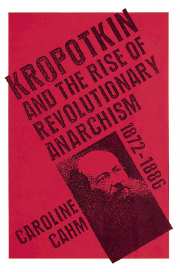Book contents
- Frontmatter
- Contents
- Preface
- Acknowledgements
- Introduction
- Part I Kropotkin and the development of the theory of anarchist communism
- 1 Bakuninism
- 2 Anarchist communism
- Part II Kropotkin and the development of anarchist ideas of revolutionary action by individuals and small groups (1872–1886)
- Part III Kropotkin and the development of anarchist views of collective revolutionary action (1872–1886)
- Conclusion
- Notes
- Bibliography
- Index
2 - Anarchist communism
Published online by Cambridge University Press: 14 September 2009
- Frontmatter
- Contents
- Preface
- Acknowledgements
- Introduction
- Part I Kropotkin and the development of the theory of anarchist communism
- 1 Bakuninism
- 2 Anarchist communism
- Part II Kropotkin and the development of anarchist ideas of revolutionary action by individuals and small groups (1872–1886)
- Part III Kropotkin and the development of anarchist views of collective revolutionary action (1872–1886)
- Conclusion
- Notes
- Bibliography
- Index
Summary
The origin of anarchist communist ideas
In 1868, Bakunin in defining his anti-statist position had declared himself to be a collectivist.
I am not a communist because communism concentrates and absorbs all the powers of society into the state, because it necessarily ends in the centralisation of property in the hands of the state when I for my part want the abolition of the state … I want society and collective property to be organised from the bottom upwards by means of free association and not from the top downwards by means of some sort of authority … it is in this sense that I am a collectivist.
At this stage, according to Kropotkin, the term ‘collectivist’ was preferred to that of ‘anarchist’ because anarchy was associated with the economic ideas of the proudhonians: ‘The word an-archy (this was how it was then written) seemed to associate the party too closely with the proudhonians, whose ideas of economic reform the International was at that moment combatting.’. But all those who finally disassociated themselves from the authoritarianism of the sympathisers of Marx and called themselves collectivists were not anti-statists. And during the arguments that developed in the Anti-authoritarian International the latter came to be identified as anarchists.
At first the word ‘anarchy’ was used by the statists as a term of abuse to discredit the anti-statists. In Les prétendues scissions de L'Internationale (March 1872) Marx accused the bakuninists of wanting to destroy the International in order to replace it with anarchy. Hales, the English delegate at the Congress of Geneva in 1873, actually argued that the bakuninists were advocates of anarchy which was incompatible with collectivism.
- Type
- Chapter
- Information
- KropotkinAnd the Rise of Revolutionary Anarchism, 1872-1886, pp. 36 - 68Publisher: Cambridge University PressPrint publication year: 1989

